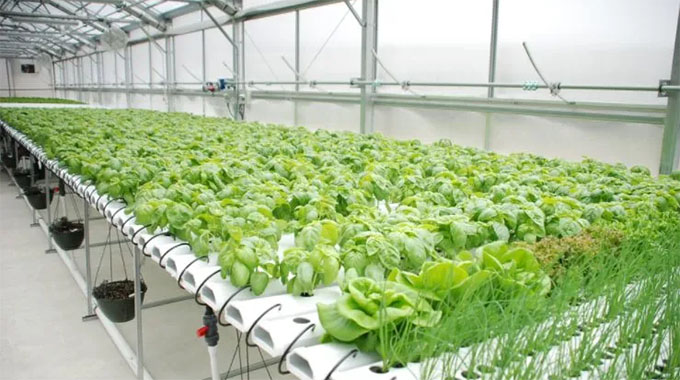Harare to benefit from new farming system

Elita Chikwati-Senior Agriculture Reporter
Non-governmental organisation, Danchurchaid (DCA) in collaboration with the World Food Programme and Agritex, is set to train Epworth and Harare South urban farmers on the hydroponics farming system as part of efforts to build resilience among vulnerable communities.
Hydroponics is a type of horticulture and a subset of hydroculture which involves growing plants, usually crops, without soil, by using mineral nutrient solutions.
The DCA is promoting organic farming which promotes use of organic fertilisers as opposed to artificial nutrients.
In an interview on the sidelines of the training of trainer programme in Harare on Friday, DCA resilience field officer, Mr Victor Buwu, said they were introducing hydroponics to people in urban areas to boost food and nutrition security.
“The 2021 ZimVac reports states that 2,4 million urban dwellers were food insecure,” he said. “The WFP used to target people in rural areas for food distribution, but now that they have realised that there is also a huge challenge urban areas.
“So, by bringing in the hydroponics system, they are trying to help alleviate food insecurity challenge. WFP used to have cash transfers to empower people, but now are introducing this technology so people can be food secure and at the same time earn an income.”
Mr Buwu said this new system of farming will help urban dwellers absorb shock such as loss of employment.
“We are trying to build resilience,” he said. “We realised that in urban areas there is a challenge for space and using hydroponics one can produce crops at a small area as long as there is sunlight. Under this system, incidences of diseases is reduced. The amount of water used in the hydroponics as compared to the conventional is reduced by 90 percent.
“For hydronics, its soilless farming. We are not going to use any soil in producing crops we just grow our plants in water. Considering the set up in urban spaces water is a commodity that can be sold, this system becomes an advantage to farmers.”
Mr Buwu said under hydroponics, plants utilise all the nutrients as the water is cycled.
“In a conventional system nutrients are leached while some form other components and are not available to crops. Since hydroponics is done under greenhouse, farmers can produce crops thought the year,” he said.
“We are encouraging farmers to grow high value crops so they get a better income. You can grow pepper, tomatoes, cucumbers, butternuts and strawberries among others.”
Mr Buwu said there were different systems for hydroponics and vulnerable communities can afford the technology.
Agritex extension officer for Epworth, Mr Maxwell Musarurwa, said the role of their department was to offer advisory services to the beneficiaries of the project.
“This system is ideal as it ensures household food self sufficiency,” he said. “The technology is convenient for urban farmers who have limited space for farming and uses less water.
“A farmer can produce enough vegetables for household consumption and surplus for sale and earn an income.”
CDA communications officer, Ms Patience Ukama, said they were promoting organic farming as the organisation was conscious of ecological justice.
“We try to make sure that whether its farming, it should be environmentally friendly,” she said. “We are promoting a healthy practice within communities that is why we insist on organic farming. We have had cases where bad practices using chemicals have resulted in water pollution and have a negative effect on people and the environment.”
Hydroponics farmer, Mrs Mawoneyi Madanha, said she started hydroponics two years ago and she has been eating healthy food.
“This is a cheaper way of producing healthy food. It is not expensive and I can produce different crop varieties on a small piece of land. I supply lettuce to local supermarkets and earning a decent income,” she said.










Comments